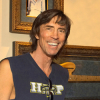Tom Scholz

Tom Scholz
Donald Thomas "Tom" Scholzis an American rock musician, inventor, engineer, and philanthropist, best known as the founder of the band Boston. He is also the inventor of the Rockman portable guitar amplifier. He has been described by Allmusic as "a notoriously 'un-rock n' roll' figure who never enjoyed the limelight of being a performer," preferring to concentrate almost exclusively on his music, and in more recent years, spending much of his time working with charities...
NationalityAmerican
ProfessionRock Singer
Date of Birth10 March 1947
CityToledo, OH
CountryUnited States of America
I'm one of those artists that doesn't actually hate my old hits. I love Boston music. I really like 'More than a Feeling.' After playing it to myself in a basement for such a long time, I'm happy to do it out on stage.
Someone will say, 'Well, that's good enough.' As soon as I hear 'Good enough,' it really bothers me. I spend as much time as I think I can on anything I do. I try to do that with the people that work with me. I try to get the best out of them.
I heard 'More Than A Feeling' for the first time when somebody came running into my office in the engineering department and said, 'Your song's on the radio in the drafting department!'
I don't work out a lead section and practice it for a day and then lay it down. I don't do that. The first time I do something I think is expressive or really cool, that's what's actually on the recording.
I'm never too ambitious when I go into the studio. I always know that I'm just going into the studio to work on or try to develop an idea that I have for a song.
I'm not one of those artists who doesn't want to play their most popular songs.
The whole experience of getting an album from an artist you like and listening to it from beginning to end is sort of gone. Now it's piecemeal.
The music that I wrote and recorded is music that I really enjoy listening to. It's just dumb luck that a lot of other people do, too.
The one thing I will say for digital, and you won't hear me say that many complimentary things about it, is that it's cheap. It pretty much enables anybody to record as long as you can deal with the sound.
The studio work is the nasty, tedious, hard and nerve-wracking part, interrupted by moments of exhilaration. Playing live is the chance to actually have some fun and get on a stage.
I would be involved with music whether I had a career or not. I'm always going to be writing songs and recording them.
No one was more surprised that that first Boston record took off than the record company itself.
I took classical piano for a couple of years, but I sort of lost interest - I couldn't read a note today if I tried. I still enjoy that stuff, and I think I naturally gravitate towards the classical licks; in fact, I know that I do. I gravitate towards the classical licks that I heard by famous old composers.
I know everything that you can do with digital processing and digital editing inside and out, but I absolutely refuse to push the buttons and don't even want to know how to load and unload the files.